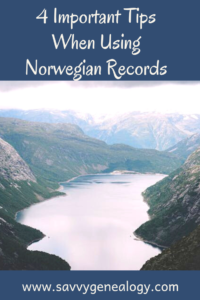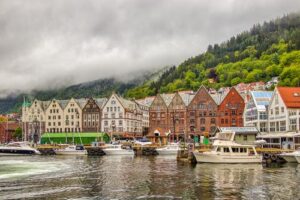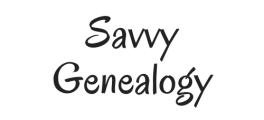4 Important Tips When Using Norwegian Records
There are many things to be aware of when working with Norwegian records or any Scandinavian records. These things will help you find your Norwegian ancestors faster and more efficiently if you understand them. So take the time to learn how the Norwegians do things and you will find success.

Naming Patterns in Norwegian Records
Norwegian people have different naming patterns then what we do. The official name for it is Patronymics. It means the child’s surname is the first name of the father. So men would be Jens Andersen or the son of Anders and women would be Johanna Andersdatter or the daughter of Anders. Each generation is like this.
Women also carried their maiden names into their married lives as well. So Johanna Andersdatter would marry Olaf Nielsen and would still be known as Johanne Andersdatter on records.
So when searching for your ancestor, remember to look at the surname and you will know the first name of your ancestor’s father. Then you can take other clues such as other family members, the birth place or date, etc. to find the correct ancestor.
Towns of Origin
Norway has a different way to name their counties and towns. For us in America it’s state, county, and city/town. In Norway it’s county, parish, city/town, and village/farm. So in other words state=county, county=parish, and city=city, then farm.

When your ancestor comes from Vikedal, Norway they are really saying the farm or town. You will need to look up where that city or farm is to find more genealogy records for your ancestor.
I use Family Search Wiki to learn what county and parish that town comes from. But you can definitely Google it or use some other means to locate it.
Addresses in Norwegian Records
Norwegians and any Scandinavians really, use their farm like an address. Long ago, the people didn’t have permanent surnames. So you could literally have multiple Jens Jensens living in the same town. That’s when they started putting their farm names at the end to distinguish each other. Jens Jensen Stolsmark would be different from Jens Jensen Krogh. They may come from the same town, but they have different farms that will lead to them having different lives in that same town.
So as you’re looking for your ancestor, look to see if they have 3 names. If there’s a name after the patronymic surname, then likely that is their farm address. This will give you a clue as to where to look for their genealogy records.
Language
Many of the Norwegian genealogy records have been translated into English. Even Norway’s Digital Archives website has an option to use English. But it doesn’t translate the original Norwegian records. So at some point you will have to learn some Norwegian. It’s actually easier than you think. Because learning genealogy Norwegian is all you need to know.

You can find help with the language in a number of places. Facebook groups, Google translate, native Norwegians, all great places to learn the language. But I like to use Family Search Wiki because of two reasons. They have a common genealogy word list for each language and it shows the heading translation for each genealogy record. Church record and census record headings are translated in English. All you have to do is plug in your ancestor’s information to find out when and where they were born, for example.
Conclusion
And that’s how you prepare yourself before diving into Norwegian records. These are important to understand so take the necessary time to learn it before diving into the records. You will appreciate your ancestors so much more!
For related reads check out my other Norwegian articles…
- Norwegian Farm Books and How to Use Them
- How to Find Norwegian Birth Records Like a Pro
- Norwegian Emigration-Where Do I Go?
And as always…good luck and happy hunting!
Tiffany
P.S. Contact me if you are stuck with your Norwegian research. It’s my specialty and I can help you create a plan that will work for your genealogy journey and goals.
Norway, norway census records, norway church records, norway digital archives, norway names, norway places
